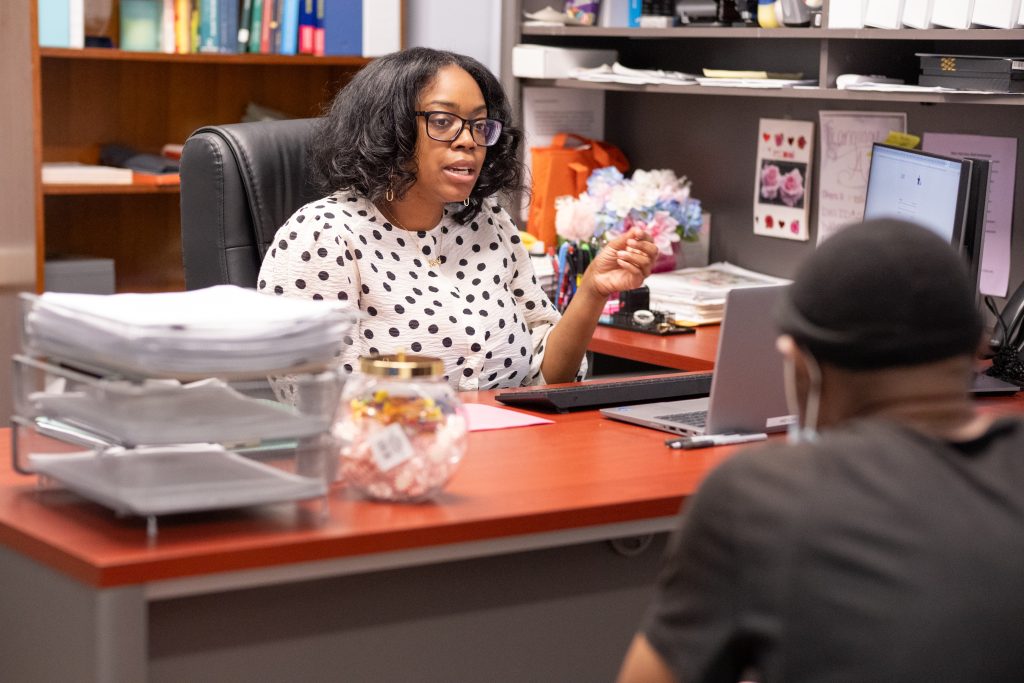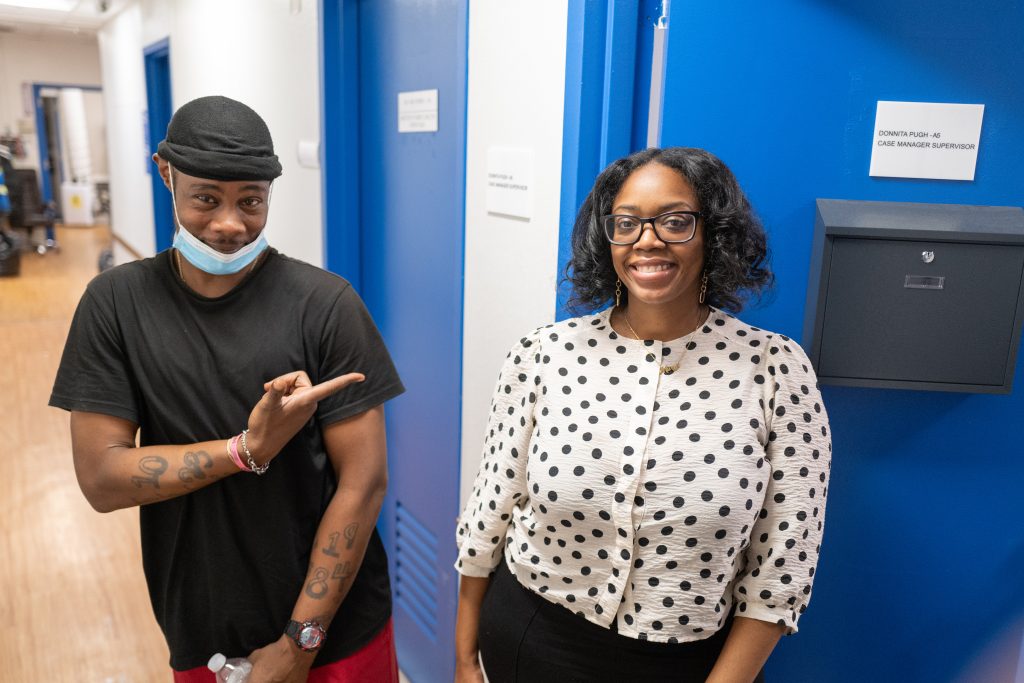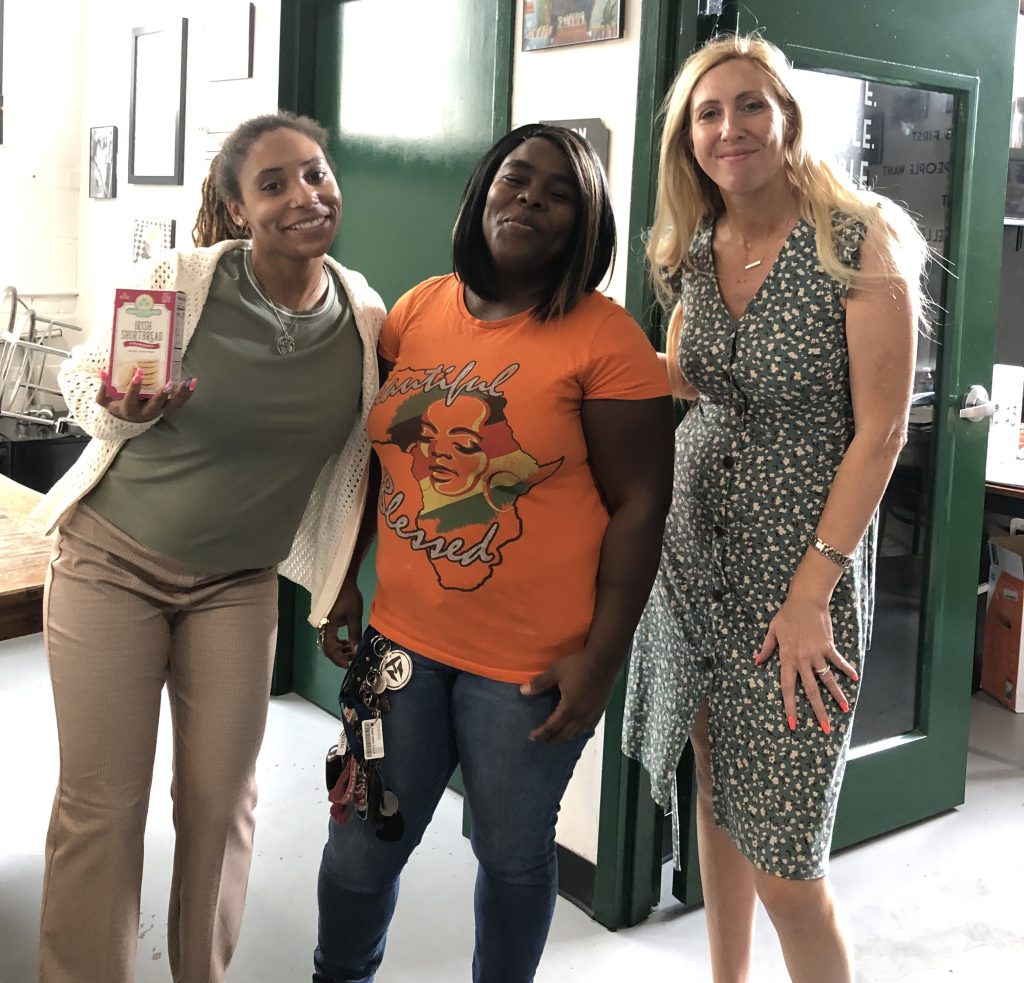William Richardson had lost his job and could no longer tolerate the turbulence of life at home. In October 2021, he left and started staying at the New York Avenue Men’s Shelter, which offers dinner, a bed and case management services for those dealing with the challenges that lead to homelessness.
He started meeting with a case manager at the shelter, which is run by Catholic Charities of the Archdiocese of Washington, took a break, and last August started up again with Donnita Pugh, case manager supervisor at the facility in northeast DC.
Now working on getting his own apartment, Richardson, 40, says Pugh’s professional and compassionate approach to case management has enabled him “to let his guard down” and develop the confidence to pursue a better life for himself.
At Catholic Charities DC, case management is an integral and carefully planned part of many of the agency’s programs. Working together, a client and a case manager develop a plan that includes goals for the client, typically in the areas of housing, education, and mental and physical wellness.

“I think what’s brilliant about case management at Catholic Charities is that it’s not required, but it’s always available when clients are ready,” says Pugh, who joined the agency in 2018. “We don’t use a cookie-cutter approach. Case management is not a one-size-fits-all process because that just doesn’t work.”
At the shelter — one of six operated by the agency — Pugh and her team of five case managers conduct the initial required intake for new residents, gathering information about their personal history and the challenges that prompted them to seek housing.
Afterward, the case managers work on engaging with clients in “informal, but intentional ways,” Pugh says.“It’s about letting them know you see them,” notes Pugh, who holds master’s degrees in forensic psychology and social work.
Case managers are at the shelter during check-in times, chatting with clients, asking if they need help with anything. Little by little, case managers and clients get to know each other, so when a client says he’d like to participate in case management, the foundation of a relationship is already in place.
Richardson describes his relationship with Pugh as “an open book,” built on the trust they’ve developed while working together on his goals. He says Pugh “goes above and beyond” in her interactions with him, either calling or meeting him in person at least once, sometimes twice, a week.
They’ve worked together to gather, complete and submit what can sometimes feel like an endless stream of paperwork required as part of the housing process. Currently, Richardson is working on securing a housing voucher, which will qualify him for a subsidy from the D.C. Housing Authority that will cover a portion of his rent.
Richardson, who used to work as a maintenance technician at an apartment building in Oxon Hill, Md., is also gathering the documents needed to enroll in a three-month building maintenance certification program that provides a stipend and the guarantee of a job upon completion of the program.
“Slowly but surely, I’m getting back on my feet,” says Richardson. “I don’t know exactly when I’ll have my own place, but I’m closer than I was a week ago, closer than I was a month ago, closer than I was a year ago.”

A ‘Humbling’ Experience
Regena Humphries, director of Catholic Charities’ Compass program, describes the experience of working with a client as “humbling.”
Humphries, who also directs intake and medical/somatic services for the agency, says she sees case management “as the way in to really understand what a person is going through. It’s not about leading them. It’s about walking alongside them and offering support on the journey to who they’re becoming.”
In the Compass program, caseloads are intentionally small, enabling staffers to provide intensive case management services to adults living in Wards 7 and 8 of D.C. – traditionally underserved communities.
At the start of services, a client (or “member” as they’re known in the program) and a case manager (or “partner)” meet weekly at the member’s home, the library, or maybe a coffee shop. Gradually, over a two-year period, the number of meetings drops to once a month. Upon graduation from the program, a member can join one of Compass’ support groups.
The combination of small caseloads and the unique nature of the Compass team enables partners to connect deeply with members. All of the team’s partners — and its interns — are affiliated with The Catholic University of America — either as graduates of the master’s program in social work or as graduate students in the program. Catholic Charities’ Pope Francis Scholarships cover the cost of tuition for selected graduate students, some of whom are from Wards 7 and 8.
Joey Garnett, program manager for Compass who grew up in Ward 8 and earned his master’s at Catholic University, notes that securing housing in D.C. can be a frustrating process for members, especially when they are unsuccessful in contacting an outside agency.
“Navigating the process on your own can be overwhelming,” says Garnett. If need be, a partner will go with a member to the office of an outside agency and advocate on their behalf. “Almost always someone is able to help us right away because we’re there,” he says.
Weathering Challenges with the Support of a Partner

Loretta Jones, a single mother of four who lives in Ward 8, is the friend everyone calls when they have a problem. But she says asking for help for herself hasn’t always been easy, especially “when it comes to personal issues.” Working with her Compass partner has helped Jones to see that it’s OK to seek help.
Jones has worked on mental health issues, weathered the difficult pregnancy that preceded the birth of her youngest child, and landed a baking internship with support from her Compass partner, Dasia Adams, a case manager and the program’s community liaison.
Now, Jones is a member of the program’s “You Got You” support group and a participant in a financial wellness group facilitated by Catholic Charities’ Financial Stability Network, which provides fiscal education and mentoring. Jones, who bakes desserts for family, friends and a couple of churches in the DC area, hopes to start her own baking business.
If not for the Compass program, Jones says her life would be “quite a struggle.” But she says with Adams “walking step-by-step” alongside her, tough days aren’t nearly as hard as they used to be.
“Dasia’s a motivator,” says Jones. “I might have a day when I’m not feeling very motivated, but when Dasia checks in with me, I’m like ‘now I have the energy to get that thing done.’”
Case management by the numbers for fiscal year 2023-2024
- The New York Avenue Men’s Shelter served 916 clients. Of those, 403 received case management services.
- Engagement with clients by case managers at the shelter has increased from 37 percent in 2023 to 44 percent in 2024.
- The Compass Program served 164 people, including 65 adult members and 99 children under the age of 18. Goal attainment was 74 percent.